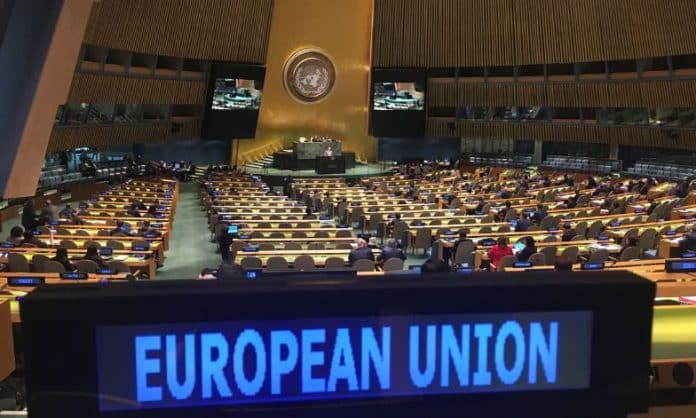The European Union has set out its priorities at the United Nations for the 77th session of the United Nations General Assembly (September 2022 – September 2023).
In the coming year, the EU says it will focus on upholding the UN Charter and the rule of law, addressing the global consequences of the Russian Federation’s invasion of Ukraine, promoting sustainable development and human rights, supporting access to quality education, strengthening global health security, and fighting climate change, biodiversity loss and pollution, as well as shaping the global digital agenda.
Defending the UN Charter
Following Russia’s invasion of Ukraine, the Council of the EU recalls the binding character of the UN Charter in its entirety – peace and security, human rights, gender equality, human dignity, equal rights of large and small nations – and stresses the universality of the UN’s founding principles.
“Today, as the world faces one of the greatest challenges to global peace and security – Russia’s war of aggression against Ukraine – upholding the rules-based international order founded on the UN Charter is more important than ever,” the EU affirms. It adds that the UN has been “responsive and adaptive” in response to the crisis by deploying and enhancing presence where needed.
“This senseless war causing massive devastation, destruction, and human suffering must end now.”
Multilateral solutions
In a world already suffering from the impacts of the Covid-19 pandemic and the climate emergency, the war in Ukraine is producing devastating effects. Countries struggling to recover from the pandemic and to make progress on the Sustainable Development Goals (SDGs) now also face looming global crises in food, energy, and finance.
The EU calls for multilateral actors – the UN, International Financial Institutions, the G7 and the G20 – to come together and put forward robust multilateral solutions.
“The EU reaffirms its conviction that the major challenges of our time, by their nature and global scope, cannot be addressed by countries acting alone but must be tackled together.”
Leaving no one behind
With less than a decade until the 2030 deadline for achieving the SDGs and progress hindered by the Covid-19 pandemic, the “triple planetary crisis” of climate change, biodiversity loss and pollution, and the global impacts of Russia’s invasion of Ukraine, the EU says it is urgent to “get on track before it is too late”.
“Our top priority is to strengthen resilience against future shocks and to ensure a sustainable, equitable and inclusive recovery,” it outlines. The EU says its Global Gateway strategy, which will see the EU invest in digital; climate and energy; transport; health and education and research, will contribute to the implementation of the SDGs.
The EU also supports the Secretary-General’s proposal for a renewed social contract that encompasses a strong social and economic dimension.
It also notes that access to inclusive and equitable quality education is not only a fundamental human right but essential to progress on all SDGs.
Preparing better for the future
On climate, the EU calls for the full implementation of the commitments from the 2021 UN Climate Summit in Glasgow and ensure higher ambition at the upcoming UN Climate Change Conference (COP27) in Egypt. The EU also says it must support the Secretary-General in his efforts to phase out new fossil fuel exploration and fossil fuel subsidies.
The EU has increased its emissions reduction target to at least 55% by 2030. The European Climate Law sets a legally binding target of net zero greenhouse gas emissions by 2050.
With regards to health, the EU says the Covid-19 pandemic has highlighted the need for a stronger and more inclusive global health architecture, with a central role for the World Health Organization (WHO). The EU and its Member States are the largest donors to WHO.
Our Common Agenda
“Our Common Agenda”, a report which sets out UN Secretary-General António Guterres’ vision on the future of global cooperation, is a “historic opportunity” to introduce global governance reforms, the EU finds. It adds that the agenda provides an important framework to uphold human rights across the work of the UN.
“The EU will make all efforts to put human rights at the centre of the UN agenda and will promote a strengthened global system for human rights by building deeper alliances with partners.”
The EU also calls for an ambitious “New Agenda for Peace” that addresses current and future challenges and threats to peace and security. Together, EU Member States contribute to a quarter of the UN peacekeeping budget.
“We need to ensure that the UN Security Council as the main body for international peace and security can fulfil its role in the face of increasing geopolitical tensions and rivalries.”
UN 2.0
The complex global environment reaffirms the need for a UN that is ready for the future, the EU affirms: “We cannot address 21st century problems with a 20th century toolbox.”
The EU and its Member States are the largest donors to the UN system, providing almost one quarter of all financial contributions to the UN’s agencies, funds and programmes.
It calls for transformative changes, so the UN becomes a UN 2.0 “which is sustainably funded, more inclusive, transparent and accountable, and ultimately properly equipped for future challenges and opportunities.”
More info
- Read the Council of the EU’s conclusions in full
- UN Brussels Chief: UN-EU cooperation key, as no one nation can solve global challenges
- EU at the UN General Assembly
- EU-UN Global Partners




